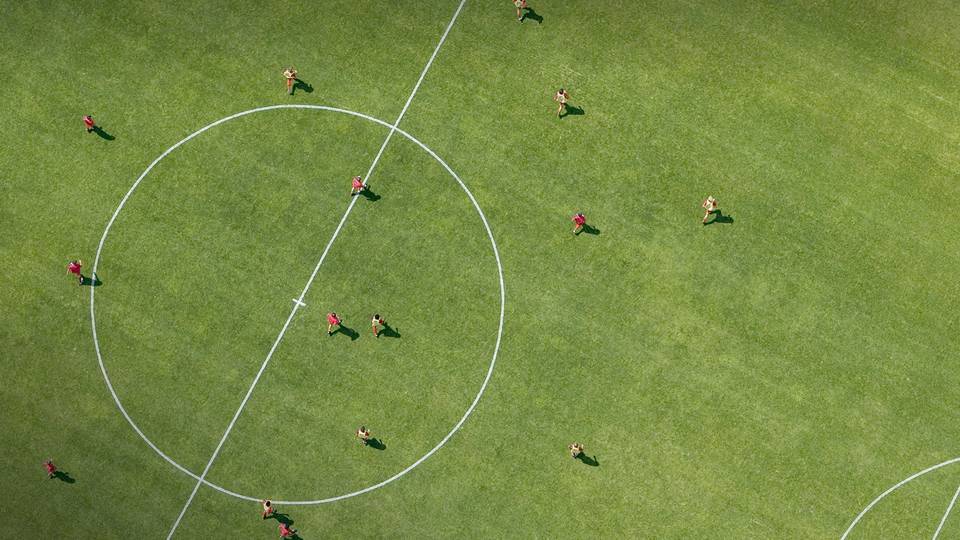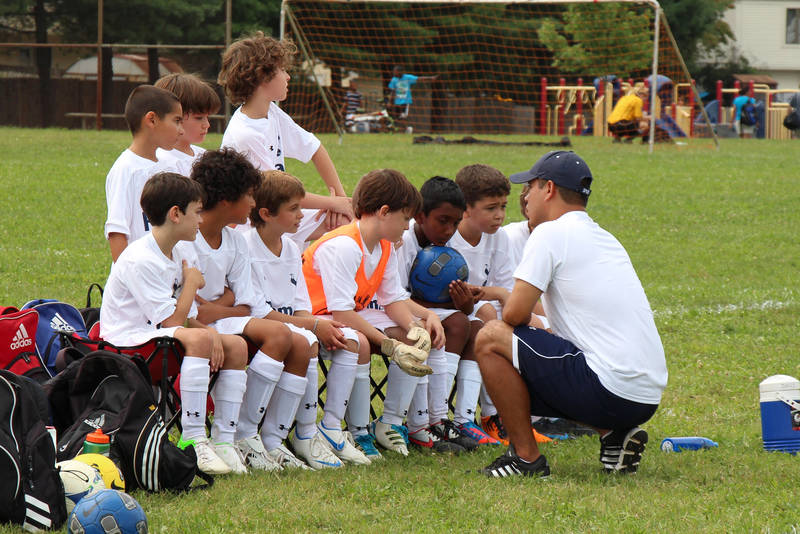Training young footballers at the U12 level requires a balanced approach that develops technical skills, tactical understanding, and physical capabilities. Coaches working with this age group face the unique challenge of nurturing players who are beginning to grasp more complex aspects of the game while still needing fundamental skill development. Effective U12 football training should focus on ball mastery, dribbling, turning, and passing exercises that are both challenging and engaging for players at this critical developmental stage.
Well-structured training sessions for 12-year-olds should incorporate a mix of technical drills and small-sided games that maximise touches on the ball. The search results highlight several quality resources that offer specialized U12 drills focusing on ball control, passing, receiving, and shooting—all essential components for developing well-rounded young players. These sessions need to be sequenced thoughtfully to maintain engagement while progressively building skills.
Overlap passing drills and turning exercises are particularly valuable for U12 players as they begin to understand positional play and movement off the ball. Soccer Coach Weekly and similar resources provide numerous training activities specifically designed for this age group, helping coaches create sessions that balance fun with deliberate practice. Remember that at this age, keeping players engaged through varied, challenging, and enjoyable activities will ultimately yield the best results in their football development.
Fundamentals of U12 Football Training
At U12 level, players need to master basic skills while developing a deeper understanding of football's rules and tactical concepts. Focus on fundamentals creates a solid foundation upon which more advanced abilities can be built.
Developing Core Skills
Dribbling forms a crucial component of U12 training. Set up simple cone drills where players navigate through obstacles, encouraging close ball control and change of direction. These exercises should gradually increase in complexity as players improve.
Passing accuracy becomes increasingly important at this age. Use short-distance passing drills with partners, emphasising proper technique with both feet. A common effective drill involves players standing 5-10 metres apart with cones marking targets.
Shooting practice should occur regularly with appropriate-sized goals. Focus on proper striking technique before introducing more complex scenarios. Small-sided games with goals encourage players to shoot more frequently in game-like situations.
Ball control exercises help players develop their first touch. Simple activities using different ball surfaces (inside foot, outside foot, sole) improve overall comfort with the ball. Many professional academy coaches recommend daily touch exercises.
Understanding the Rules of the Game
Rule comprehension at U12 level should extend beyond basics to include offside, advantage, and substitution protocols. Short classroom sessions using diagrams or videos can effectively demonstrate these concepts before practical application.
Positional awareness becomes more sophisticated at this age. Players should understand basic defensive and attacking roles, though without rigid specialisation. Small-sided games (5v5 or 7v7) provide excellent opportunities to teach positional concepts in realistic scenarios.
Game management skills begin developing at U12. Teach players about tempo, when to keep possession versus when to attack directly. Simple decision-making exercises with soccer balls and defined playing areas help reinforce these concepts.
Team shape and formation basics should be introduced gradually. Using training bibs during practice helps players visualise formations and understand spacing on the pitch. Many youth coaches find that simplified 1-3-2-1 or 1-3-3 formations work well at this age.
Designing Effective Training Sessions
Creating purposeful training sessions for U12 footballers requires careful planning and consideration of player development needs. Effective sessions balance technical skill development with game understanding while keeping young players engaged and motivated.
Session Structure and Drills
A well-structured U12 training session typically follows the "Three Rs approach" - ready, rehearse, and review. Begin with a 10-15 minute dynamic warm-up that incorporates ball work to maximise engagement from the start.
The main body should include 2-3 focused activities that progress logically. Consider using small-sided games that practice specific skills in game-like scenarios.
Include possession-based drills to develop technical ability and decision-making. These might involve 4v2 or 5v3 setups with clear coaching points about body position and passing options.
Finish with a modified match that reinforces the session's themes. This allows players to apply learned skills in a competitive environment.
Always leave 5 minutes for a cool-down and brief feedback session. This helps players understand what they've learned and sets expectations for the next training.
Age-Appropriate Training Techniques
U12 players have specific developmental needs that should guide your coaching approach. Focus on fundamental skills like first touch, passing accuracy, and basic game awareness rather than complex tactical concepts.
Keep instructions clear and concise. Young players typically have shorter attention spans, so deliver coaching points in 30-second bursts rather than lengthy explanations.
Use visual demonstrations whenever possible. Many U12 players learn better by watching than listening to verbal instructions.
Incorporate fun, competitive elements into drills. Small challenges and point-scoring systems maintain motivation throughout the session.
Every adult member involved should understand that development trumps winning at this age. Create an environment where players feel safe to make mistakes and experiment with their skills.
Balance repetition with variety. While players need to practice core skills frequently, changing the format of drills prevents boredom and maintains engagement.
Strategies for Team Play Development
At U12 level, players are ready to develop more structured team play. This crucial stage bridges individual skills with collaborative tactics, establishing foundations for positional awareness and communication that will serve players throughout their football journey.
Offensive and Defensive Tactics
Offensive tactics for U12 players should focus on maintaining possession and creating scoring opportunities. Teach forwards to make runs into space rather than simply chasing the ball. Introduce the concept of triangular passing, where players position themselves to create multiple passing options for teammates.
Players should practise quick transitions from defence to attack, recognising when to counter-attack and when to build up play slowly. Small-sided games (4v4 or 5v5) help reinforce these concepts in game-like situations.
For defensive tactics, teach players to work as a unit rather than individual defenders. Introduce the concept of pressing as a team and establish clear triggers for when to press the opposition.
Defenders should learn when to intercept passes versus when to contain attackers. Drills focusing on defensive shape and recovery runs are particularly valuable at this age.
Position-Specific Training
While U12 players should experience multiple positions, they benefit from understanding position-specific responsibilities. Dedicate portions of training to role-specific skills:
Forwards:
- Movement off the ball to create space
- Finishing techniques (1v1 with goalkeeper, volleys, headers)
- Hold-up play and linking with midfielders
Midfielders:
- Passing range and decision-making
- Supporting both attack and defence
- Receiving skills while scanning the pitch
Defenders:
- Proper tackling techniques
- Marking and tracking runners
- Building attacks from the back
Goalkeepers:
- Basic handling and footwork
- Distribution choices
- Communication with defenders
Rotate sessions so each position receives focused attention weekly. This balanced approach ensures all players develop comprehensive skills while beginning to understand their potential specialisms.
Improving Teamwork and Communication
Communication is the backbone of effective team play. Establish clear, simple terminology that players use consistently during matches and training. Encourage players to call for the ball, alert teammates to pressure, and provide guidance to teammates.
Implement drills that require verbal communication:
- Blind passing exercises where players must communicate direction
- Defending scenarios where players call "man on" or "time"
- Set-piece organisation requiring players to establish positions verbally
Create problem-solving scenarios in training where teams must work together. For example, set up possession games with numerical advantages (5v3) that can only be overcome through effective teamwork.
Video analysis sessions can be particularly effective at this age. Reviewing professional matches or the team's own performances helps players identify good examples of communication and teamwork. This soccer training technique builds tactical awareness beyond just physical practice.
Supporting Player Progression
Effective player progression in U12 football requires structured monitoring and thoughtful preparation for future development stages. Coaches must focus on documenting skill advances while preparing young players for the physical and tactical challenges they'll face in U14 and beyond.
Tracking Skill Improvement
Keeping consistent records of each player's development is essential for supporting progression. Create individual player profiles that track technical abilities, tactical understanding, physical growth and psychological aspects.
Use simple assessment scales (1-5) for key skills like passing accuracy, first touch, and positional awareness. Conduct evaluations every 8-10 weeks to identify trends and improvement areas.
Video analysis can be particularly valuable at the U12 level. Record training sessions or matches periodically to review with players, highlighting positive moments and areas for improvement.
Involve the players in self-assessment. Help them develop realistic goals that bridge the gap between their current abilities and those needed for U14 football. This ownership of development builds accountability and motivation.
Transitioning to Older Age Groups
The jump from U12 to older age groups represents a significant challenge in youth football development. Players moving to U14 will encounter larger pitches, increased physicality, and more complex tactical demands.
Gradually introduce U12s to aspects of U14 play during their final months in the younger age group. Arrange occasional training sessions or friendly matches with U13/U14 teams to acclimate players to the higher intensity.
Focus on developing robustness and resilience. Incorporate appropriate strength and conditioning exercises suited to pre-adolescent bodies, emphasising proper technique rather than intensity.
Tactical awareness becomes increasingly important as players advance. In late U12, begin introducing more sophisticated concepts like defensive shape, attacking patterns, and positional rotations that will feature prominently in U14 soccer.
Communication with parents is crucial during this transition. Hold information sessions explaining the changes their children will experience and how they can best support continued development at home.












